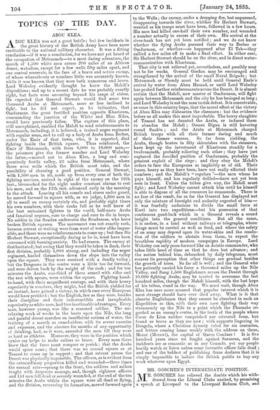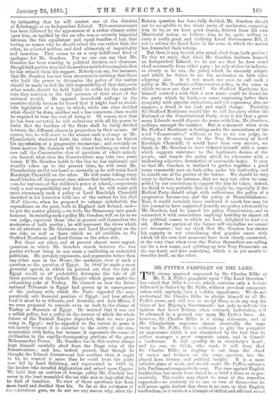MR. GOSCHEN'S INTERMEDIATE POSITION.
MR. GOSCHEN has relieved the doubts which his withdrawal from the Liberal Clubs excited, by promising a speech at Liverpool to the Liverpool Reform Club, and
by intimating that he will contest one of the districts of Edinburgh as an Independent Liberal. This announcement has been followed by the appearance of a rather clumsy satire upon him, as typified by the ass who was so severely impartial between the two equidistant and equal bundles of hay, that having no reason why he should select the one rather than the other, he selected neither, and died ultimately of impartiality and inanition. That seems to us a very indifferent kind of apologue for Mr. Goschen. For no one can say that Mr. Goschen has been wanting in political decision and clearness, though both parties may feel themselves entitled to complain that he has refused them his support. Nobody can say, for instance, that Mr. Goschen has not been strenuous in insisting that those who hold the power to determine the policy of the nation should be made to feel the full responsibility of that duty,—in other words, should be held liable to suffer for the expenditure they sanction to the full measure of their share of the national wealth. He opposed household suffrage in the counties chiefly because he feared that it might lead to socialistic legislation of a type in which, while one class decided what should be done, another and a less numerous class would be required to bear the cost of doing it. Of course, now that he has been outvoted, he will endeavour with all his power to insist that the burdens of the State shall be fairly divided between the different classes in proportion to their means. Of course, too, he will resist to the utmost such a change as Mr. Chamberlain shadowed forth the other day, when he hinted his aprrobation of a progressive income-tax ; and certainly on these matters Mr. Goschen will be found inclining to what we now call the Conservative view of questions of which nobody can foretell what view the Conservatives may take two years hence. If Mr. Goschen holds to the line he has uniformly and steadily taken up to the present time, he will resist Mr. Chamberlain on the one hand as earnestly as he will resist Lord Randolph Churchill on the other. He will resist taking every small burden off the poorest class, where that burden,—as in the case, for instance, of the children's pence at school,—represents truly a real responsibility and duty. And he will resist still more strenuously such a policy as Lord Randolph Churchill sketched in his interview with one of the writers for the Pall Mall Gazette, when he proposed to enlarge indefinitely the expenditure on the poor, both in England and Ireland, and— to put the matter plainly,—to bribe the Democracy into goodhumour. In resisting such a policy Mr. Goschen will, so far as we can judge, represent those who at present call themselves the moderates of both parties ; he will represent the views which we all attribute to Mr. Gladstone and Lord Hartington on the one side, as well as those which we all attribute to Sir Stafford Northcote and Lord Cairns on the other side.
But there are other, and at present almost more urgent, questions in which Mr. Goschen stands between the two parties without being in any sense a vacillating or undecided politician. He certainly represents, and represents better than any other man in the House, the moderate view of such a question as the question of Egypt. In 1882 he made a most powerful speech, in which he pointed out that the fate of Egypt would in all probability determine the fate of all those portions of the Turkish Empire which groan under the exhausting yoke of Turkey. He showed us how the International Tribunals in Egypt had grown up in consequence of the jealousy with which the Porte regarded the comparatively safe financial position of Egypt ; and how utterly fatal it must be to Albania, and Armenia, and Asia Minor, if we were prepared to concede even an inch to the claims of Turkey as Suzerain of Egypt. He insisted that it was not a selfish policy, but a policy on the success of which the whole future of the Turkish Empire depended, that we were pursuing in Egypt ; and he appealed to the nation to press it not merely because it is essential to the safety of our com munication with India, but because it represents the cause of civilisation in the rapidly-decomposing portions of the great Mohammedan Power. Mr. Goschen has in this matter always kept himself carefully aloof from the Jingo cries of the Conservatives ; and has, indeed, proved, that though he thought the Liberal Government less resolute than it ought to be, he trusted it more than he could trust the party now led by Lord Salisbury, and represented in 1878 by the leaders who invaded Afghanistan and seized upon Cyprus. We hold that on matters of foreign policy Mr. Goschen has never in the least resembled the ass who was so impartial that he died of inanition. No view of these questions has baen more lucid and decided than his. So far as the sulstance of his ccnvictions goes, we do not see any reason why, after the Reform question has been fully decided, Mr. Goschen should not be acceptable to the whole party of moderates, supposing him to be, as we have good reason, derived from his own Ministerial action, to believe him to be, quite willing to carry a really great and vivifying Local Government Bill, if not to reform the Land Laws in the sense in which the nation has demanded their reform.
But then, it may be said, why stand aloof from both parties ? To this we reply, that when Mr. Goschen declares himself an Independent Liberal, we do not sea that he does stand aloof necessarily from either party ; he only wishes to indicate, as clearly as he can, the policy which he sincerely adopts. and which he desires to see the moderates on both sides adopting also. Is it not much too soon to call such a policy as Mr. Goschen's a Conservative policy, in the sense in which si-e now use that word ? Sir Stafford Northcote has himself avowed a wish that a new name could be found for the party which he leads,—a name expressing better their sympathy with popular aspirations, and yet expressing also, we suppose, a dread of too rash and rapid change. Probably Sir Stafford Northeote would like to call his party either the National or the Constitutional Party, were it not that a great many Liberals would dispute the name with him, Mr. Goschen, perhaps, amongst the number. But at a moment when even Sir Stafford Northcote is fretting under the associations of the word "Conservative," without, so far as we can judge, inclining in the very least to the Tory Democracy of Lord Randolph Churchill, it would have been very unwise, we think, in Mr. Goschen to have ticketed himself with a name which suggests resistance to the legitimate desires of the people, and brands the policy which he advocates with a misleading adjective, destructive of reasonable hopes. It may be that Mr. Goschen is destined to gather together a good many reasonable men on both sides under his leadership, and to mould one of the parties of the future. We should be very sorry to declare, for instance, that we may not often be compelled by our convictions to support the line he takes ; indeed, we think it very probable that so it might be, especially if the Radical Party should adopt with enthusiasm the policy of a progressive Income-tax, and the policy of Disestablishment. Now, it would certainly have rendered it much less easy for this journal to have supported heartily any policy advocated by Mr. Goschen, had he named his policy Conservative, and so connected it with associations implying hostility to almost all the political causes to which we have delighted to lend our aid. How the parties of the future will crystallise we cannot yet determine ; but we think that Mr. Goschen has shown his sagacity in not abandoning that popular name with which all his own best measures have been closely connected, at the very time when even the Tories themselves are calling out for a new name, and splitting-up into Tory Democrats on the one hand, and into something which is as yet unable to describe itself, on the other.







































 Previous page
Previous page